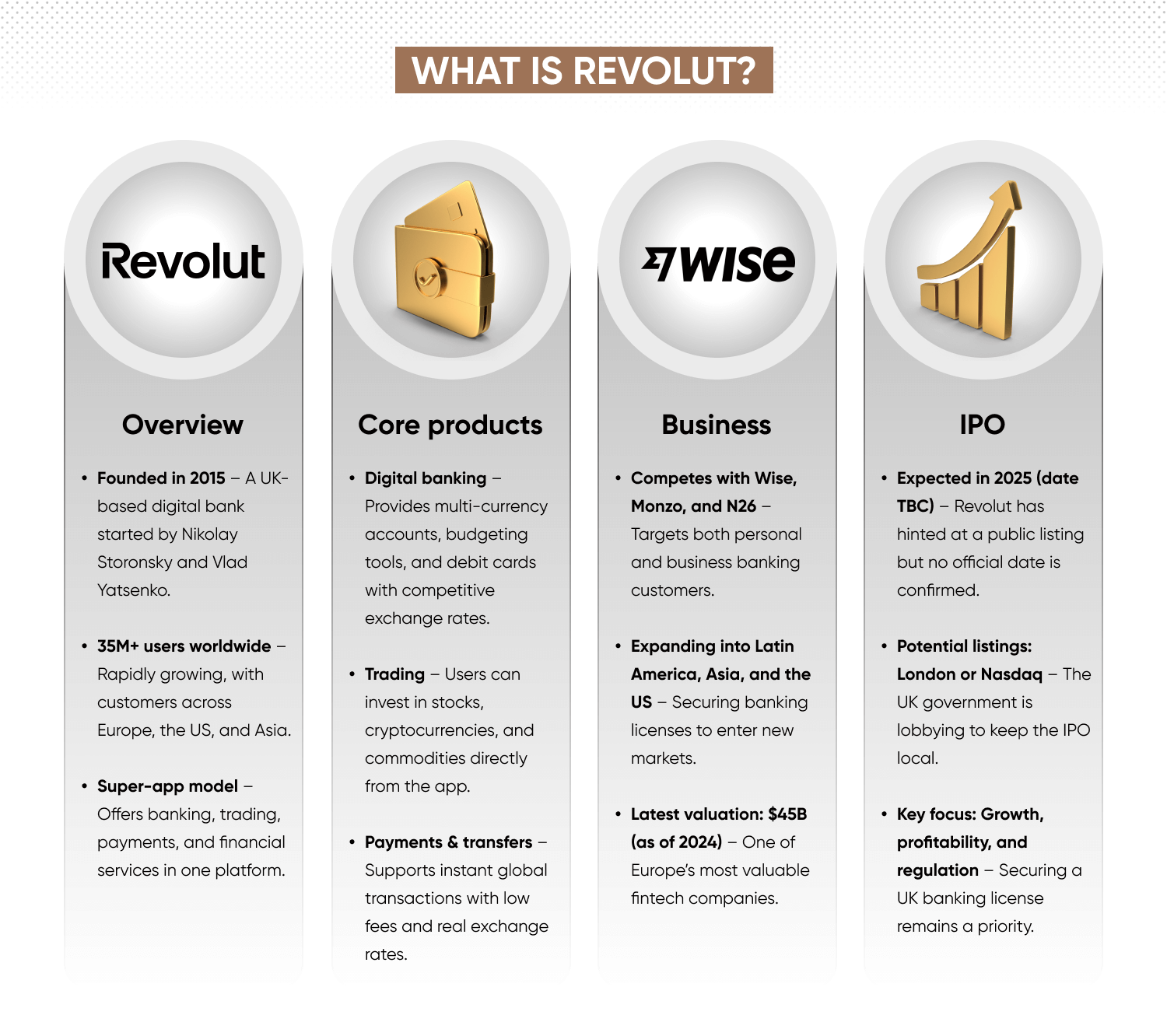Revolut IPO- how to trade Revolut stock

Learn about Revolut and its upcoming IPO, potential price drivers, and how to trade Revolut stock via CFDs when it lists.
When is the Revolut IPO date?
As of February 2025, Revolut has not officially announced a specific date for its initial public offering (IPO). However, reports suggest that the company is preparing for a potential IPO in 2025, following its recent valuation of approximately $45bn. Revolut is reportedly considering listing on the Nasdaq Stock Market in the US, although the UK government is actively engaging with the company to promote London as a listing destination.
Several factors could influence the timing and location of Revolut's IPO:
- Financial performance: in 2023, Revolut reported revenues exceeding $2.2bn, with pre-tax profits of $545m, reflecting strong financial performance.
-
Regulatory approvals: the company secured a UK banking license in July 2024 after a three-year process, allowing it to expand its deposit protection and mortgage offerings in the UK.
-
Market conditions: the outlook for IPOs in 2025 is brighter than in previous years, thanks to improved macroeconomic conditions and pent-up demand. However, external factors such as interest rates and geopolitical conditions may continue to impact investor sentiment.
What is Revolut?
Revolut is a UK-based financial technology company offering digital banking services, including payments, foreign exchange, stock and crypto trading, and budgeting tools. Founded in 2015 by Nikolay Storonsky and Vlad Yatsenko, it has grown into one of Europe’s largest fintech firms, providing a mobile-first alternative to traditional banks.
Key milestones in Revolut’s history
- 2015 – launched in the UK, focusing on low-cost foreign exchange and multi-currency accounts.
- 2018 – obtained a European banking license, expanding into broader financial services.
- 2020 – entered the US and Japanese markets, accelerating global expansion.
- 2021 – reached a $33bn valuation, becoming one of Europe’s most valuable fintech startups.
- 2023 – reported $2.2 billion in revenue with pre-tax profits of $545m.
- 2024 – surpassed 50m users, secured a UK banking license, and announced plans to relocate global HQ to London’s Canary Wharf.
- 2025 – preparing for an IPO, with a valuation estimated around $45bn and considerations for a Nasdaq or London listing.
Revolut’s key features
- Multi-currency accounts – users can hold and exchange currencies at interbank rates.
- Stock and crypto trading – customers can invest in stocks, cryptocurrencies, and commodities directly from the app.
- AI-powered budgeting tools – real-time spending insights help users manage finances.
- International transfers – low-fee global transfers with real-time exchange rates.
- Premium and Metal accounts – subscription-based plans with perks like cashback, insurance, and airport lounge access.
Revolut operates under an e-money license in the UK and has secured banking licenses in several European countries, allowing it to expand its product offering. The company has rapidly grown, reaching millions of users worldwide and is considered one of the most valuable fintech startups.

How does Revolut make money?
Revolut operates as a digital financial super app, offering banking, payments, and investment services primarily through its mobile platform. Unlike traditional banks, it doesn’t rely on physical branches but instead delivers a tech-driven, mobile-first experience.
Revolut’s revenue comes from several key streams – here’s more on the main ones.
|
Revenue stream |
Description |
|
Interchange fees |
Revolut earns a small percentage from card transactions whenever users make payments using their Revolut debit or prepaid cards. This fee is paid by the merchant, not the user. The more transactions processed, the higher the revenue. |
|
Subscription plans |
Revolut offers Plus, Premium, Metal, and Ultra plans, providing perks like higher withdrawal limits, travel insurance, cashback, and airport lounge access for a monthly or annual fee. Subscription revenue ensures predictable recurring income. |
|
Currency exchange |
While Revolut offers free interbank exchange rates on weekdays, it charges a markup on weekends and for high-volume transactions, generating revenue from forex conversions. |
|
Crypto and stock trading |
Users can buy and sell stocks, cryptocurrencies, and commodities through the app. Revolut earns from commissions, spreads, and withdrawal fees, making it a key revenue driver, especially as retail trading grows. |
|
Business accounts |
Revolut Business offers accounts tailored for companies, freelancers, and entrepreneurs, providing features like multi-currency payments, corporate cards, and expense management. Revenue comes from monthly fees and payment processing charges. |
|
Lending services |
Revolut generates income from lending products like personal loans, credit lines, overdrafts, and BNPL (buy now, pay later) services. It earns through interest charges and loan fees, similar to traditional banks. |
What might influence the Revolut live stock price?
Revolut’s stock price, once publicly traded, will be influenced by a range of factors, from market conditions and company performance to regulatory developments and competitive pressures. Investors will closely watch its financial health, user growth, and industry trends to gauge its potential. Below are some key factors that could drive fluctuations in Revolut’s live stock price.
Market conditions and industry trends
Revolut’s stock will be impacted by macroeconomic factors such as interest rates, inflation, and global economic conditions, which influence investor confidence. As a digital bank, its valuation will also reflect broader fintech sector trends and shifts in financial markets. The success of its IPO will set the tone for initial investor sentiment.
Company fundamentals and growth
Revolut has been profitable for multiple years, a key differentiator in the fintech space. Investors will track its revenue growth across banking, trading, and subscription services to gauge future expansion. Continued profitability, increasing user deposits, and higher trading volumes could drive stock gains, while slowing growth in key markets may weigh on valuation.
Competition and strategic moves
The stock’s performance will be shaped by how Revolut competes with Wise, Monzo, and traditional banks. Strategic moves such as partnerships, acquisitions, or potential buyouts could drive valuation shifts, while competitive pressure may cap growth.
Regulation and compliance
Regulatory approvals, such as securing more banking licenses, could enhance credibility and investor confidence. However, changes in financial regulations or stricter compliance rules – especially in crypto trading and financial services – could impact operations and stock performance.
Market sentiment and trading activity
Analyst buy/sell ratings, trading volume, and short interest can create volatility. Major news – such as leadership changes, security breaches, or strategic partnerships – can drive sentiment.
You can keep your finger on the pulse of the markets with expert insight from our in-house analysts. Check out our news and analysis section for more.

How to trade Revolut stocks via CFDs
As and when Revolut debuts on the stock market, there’s a few steps to take before in order to trade shares.
- Choose a brokerage platformSelect a reliable broker that offers access to Revolut shares. Trading platforms like Capital.com allow trading via contracts for difference (CFDs), allowing speculation on price movements without owning the underlying asset.
- Set up a trading accountOpen an account with your chosen platform, providing necessary personal information. You may need to verify your identity.
- Deposit funds Fund your account using a bank transfer, card, or other methods. Ensure you have sufficient capital for your trades.
- Monitor stock performanceOnce listed, track Revolut’s stock using real-time data. Follow the company’s news and financial releases that could affect its valuation.
- Place a tradeWhen ready, place a market or limit order to buy shares. Consider using stop-loss orders to manage risk.
Which other fintech stocks can I trade?
As of February 2025, Revolut remains privately held, with an IPO expected in 2025. But you can gain exposure to other fintech stocks through these publicly listed companies:
-
Paypal (PYPL) – a leading digital payments platform, owning Venmo and offering BNPL, crypto, and merchant services.
-
Block (SQ) – formerly Square, it provides POS systems, Cash App, and BNPL via Afterpay. Expanding into blockchain and AI-driven finance.
-
Visa (V) & Mastercard (MA) – global payments giants, processing billions of transactions, including Klarna BNPL payments.
-
Affirm (AFRM) – a major BNPL provider, partnering with Amazon and earning from merchant fees and financing.
-
Adyen (ADYEN) – a Dutch payment processor for businesses like Meta, Uber, and Microsoft, supporting global transactions.
-
SoFi (SOFI) – a digital bank offering loans, stock trading, crypto, and student loan refinancing.
Learn more about shares and stock markets in our comprehensive shares trading guide.
FAQs
Who owns Revolut?
Revolut is privately owned, with CEO Nikolay Storonsky as the largest shareholder. Co-founder Vlad Yatsenko also holds a stake, alongside major investors like SoftBank, Tiger Global, Coatue Management, and D1 Capital Partners. Once Revolut goes public, potentially in 2025, its ownership will expand to public investors.
How much is Revolut worth?
Revolut was last valued at $45 billion in 2024 following a secondary share sale aimed at providing liquidity to employees. However, its valuation could fluctuate ahead of an IPO, depending on market conditions, financial performance, and investor sentiment.
When will Revolut IPO?
Revolut has not officially set an IPO date, but reports suggest it could go public in 2025. The company is considering a listing on either the London Stock Exchange (LSE) or Nasdaq, but regulatory hurdles, including its pending UK banking license, could affect the timeline.
How do I invest in Revolut before its IPO?
Pre-IPO investment opportunities are typically limited to institutional investors, venture capital firms, and private equity funds. However, some pre-IPO marketplaces like EquityZen or Forge Global may offer access to Revolut shares if early investors decide to sell. Retail investors will likely have to wait until the public listing.
Will Revolut shares be available for CFD trading?
If Revolut goes public, many brokers may offer contracts for difference (CFDs) on its stock, allowing traders to speculate on price movements without owning the shares. However, availability will depend on the broker, market regulations, and whether Revolut’s stock meets liquidity requirements.
Discover more upcoming IPOs
Stay informed on upcoming IPOs, market trends, and the newest trading opportunities
Monzo IPO
